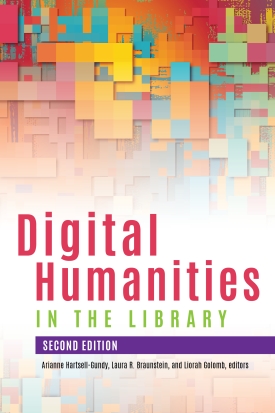Primary tabs
You don't need to be an ALA Member to purchase from the ALA Store, but you'll be asked to create an online account/profile during the checkout to proceed. This Web Account is for both Members and non-Members.
If you are Tax-Exempt, please verify that your account is currently set up as exempt before placing your order, as our new fulfillment center will need current documentation. Learn how to verify here.
- Description
- Table of Contents
- About the authors
The field of digital humanities—and the way in which libraries and library workers support and engage with it—continues to expand and evolve with technological innovations and global and national events that have had a large-scale impact on the world. There are productive new ways to interrogate and expand the meaning of digital humanities and the contributions of subject specialists, digital scholarship center directors, user experience experts, special collections librarians, and technical specialists.
This revised and expanded edition of 2015’s Digital Humanities in the Library includes key reprints from the first edition and new chapters that explore digital humanities and diversity, inclusion, and equity; issues of labor, precarity, and infrastructure; scholarly communication and taxonomies of credit; long-term sustainability; and library digital humanities in the age of institutional austerity.
Divided into sections on theory and practice, chapter authors work in a variety of institution types in many different roles and offer ideas and strategies for cross-institutional collaborations and new approaches to the digital humanities work being done. As Paige Morgan says in the Foreword, “Any digital humanist who can enthuse about data can also tell you that computers alone cannot do the work—you need the thoughtfulness of a human expert to find the way forward. This collection can help us do that.”
Foreword
Paige Morgan
Introduction
Part 1. Theory
Chapter One. Distant Reading, Computational Stylistics, and Corpus Linguistics: The Critical Theory of Digital Humanities for Literature Subject Librarians
David D. Oberhelman
Chapter Two. What Do Librarians Need to Know about Quantitative Methods in Digital Humanities?
Heather Froehlich
Chapter Three. Relearning Digital Humanities Librarianship
John Russell
Chapter Four. Centering our Values: A Framework for Digital Humanities in the Library
Pamella R. Lach
Chapter Five. Inclusive Design: A Method and Craft of Transforming Digital Humanities with User Experience
A. Miller
Part 2. Practice
Chapter Six. Into the Mix: Subject Liaison Librarians and Digital Humanities Research
Mark Dahlquist, Katie Gibson, and Jenny Presnell
Chapter Seven. Collaboration and CoTeaching: Librarians Teaching Digital Humanities in the Classroom
Brian Rosenblum, Frances Devlin, Tami Albin, and Wade Garrison
Chapter Eight. Construction and Disruption: Building Communities of Practice, Queering Subject Liaisons
Caro Pinto
Chapter Nine. A Checklist for Digital Humanities Scholarship
Elizabeth Lorang and Kathleen A. Johnson
Chapter Ten. Moderating a Meaningful DH Conversation for Graduate Students in the Humanities
Kathleen A. Langan and Ilse Schweitzer VanDonkelaar
Chapter Eleven. Spaces, Skills, and Synthesis
Anu Vedantham and Dot Porter
Chapter Twelve. Sustaining the Digital Liberal Arts: Institutional Challenges in Looking Beyond Grant Funding
Ginny Moran, Aisling Quigley, Brooke Schmolke, and Louann Terveer
Chapter Thirteen. The Digital Humanities Summer Scholars Program: Opportunities for Change During the COVID-19 Pandemic and Providing a Space for Diversity, Equity, and Inclusion in the Library
Angela Perkins
Chapter Fourteen. The Restorative Potential of Library-Based DH: Reconnecting Learning Communities in the Age of COVID-19
Emma Annette Wilson, Russell Hugh McConnell, Johanna Pang, and Maria Katsulos
Appendix. Tools and Resources Referenced in this Book
About the Authors
Arianne Hartsell-Gundy
Arianne Hartsell-Gundy is the Head, Humanities and Social Sciences Department and librarian for literature at Duke University. She was previously the humanities librarian at Miami University in Ohio. She holds a dual masters degree in Comparative Literature/Library Science at Indiana University, and a BA in English from the University of Missouri-Columbia. Her research interests include information literacy, graduate student pedagogy, collection analysis, and digital humanities. She is the co-editor of Learning in Action: Designing Successful Graduate Student Work Experiences in Academic Libraries and Digital Humanities in the Library: Challenges and Opportunities for Subject Specialists.
Laura Braunstein
Laura Braunstein is the Head of Digital Scholarly Engagement at Dartmouth College, where she co-leads Digital by Dartmouth Library, the Library’s digital collections program. She has a doctorate in English from Northwestern University, where she taught writing and literature classes. She is also a crossword puzzle constructor and co-founded The Inkubator, https://inkubatorcrosswords.com/, a project that publishes crosswords by women and non-binary puzzlemakers
Liorah Golomb
Liorah Golomb is associate professor and humanities librarian at the University of Oklahoma. She holds a doctorate in Drama from the University of Toronto and earned her MLIS at Pratt Institute. She has published several articles and chapters both within and outside of the field of librarianship. Her most recent publication is “’My Kind of Librarian or Your Kind of Library?’: Information Seeking Behavior in Supernatural,” in Loremasters and Libraries in Fantasy and Science Fiction, edited by Jason Fisher and Janet Brennan Croft.



